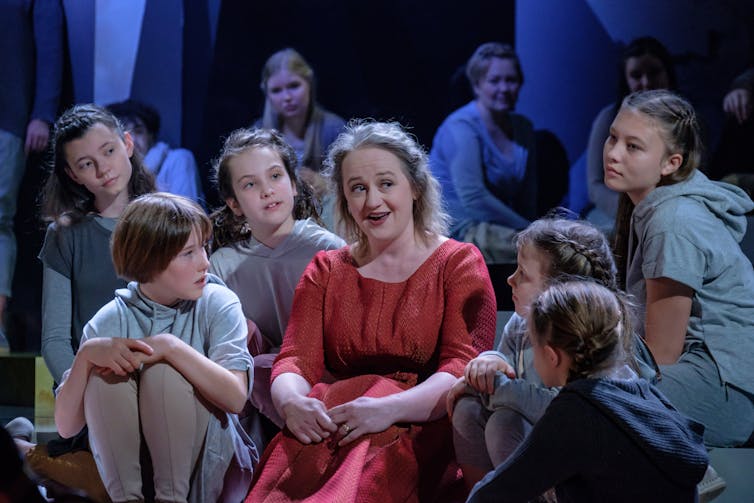Pinchgut brings yet more exciting surprises to opera with Handel's Athalia
- Written by Zoltan Szabo, Cellist and musicologist, University of Sydney
Review: Athalia, City Recital Hall, Sydney
Pinchgut Opera is a unique opera company. It specialises in lesser known repertoire of the Baroque and Classical periods of music, thus presenting Australian premieres of 17th- and 18th-century operas and oratorios with remarkable frequency. In pursuit of this mission, it consistently maintains a high quality performing standard; not an easy task from a company that gets together for seldom more than one production per year.
Astonishingly, this gem of artistic enterprise survives on a fraction of the budget of its famous sister company, Opera Australia, as presently, it does not enjoy any support from the government. And survive it does. And does so victoriously. So, why the lack of funding?
The dire state of financial affairs does not diminish the company’s determination in the slightest to be at the forefront of Australian early music playing. Several members of the chorus and orchestra have participated in Pinchgut performances since the very first production in 2002, including the current Artistic Director, Erin Helyard, who over the last week conducted a brief season of four performances of George Frideric Handel’s English-language oratorio, Athalia, completed in 1733. (An oratorio is an extensive vocal composition for soloists, choir and orchestra; meant to be performed in concert, rather than as an opera, even if this is not always the case.)
It is not just a handful of enthusiastic musicians who are devoted to Pinchgut Opera and its principles; there is also a fiercely loyal part of its audiences, who come back and support and cheer year after year, season after season. The intimate environment and great acoustics of the City Recital Hall in Sydney provide an excellent venue for the Pinchgut productions, but also a challenge: the stage (purported primarily for chamber music performances) is tiny for a traditional opera production and there is room for only a small orchestra in front of it.
This hardly seems to have caused a problem for Lindy Hume, the director of Athalia. In fact, the stage and space for the orchestra are probably a similar size to those at Handel’s disposal in the 1830s.
 Freddy Shaw as Joas, the rightful heir to the throne.
Alex Smiles
Freddy Shaw as Joas, the rightful heir to the throne.
Alex Smiles
The libretto, or text, of the oratorio was prepared by the poet Samuel Humphreys, after French playwright Jean Racine’s Athalie. This in turn was based on two books of the Bible (2 Kings and 2 Chronicles). The plot revolves around Athalia, Queen of Judah, who after her husband’s death has enforced the worship of Baal, rather than the God of Israel. However her rule is threatened by Joas (who is in hiding as Eliakim), a child and rightful heir to the throne. In the end, Joas is restored to the throne, Athalia is executed, and God triumphs.
In Pinchgut’s production, the 18th-century English text was wisely supported with modern English surtitles, projected onto stylised mountains with angular outlines and white/grey/brown colours, reminiscent of early paintings of Georges Braque.
A few steps divided the stage into smaller areas. The costumes represented similar colours in their “greige” (grey mixed with beige) tone. The loose garments looked positively trendy (as if worn by university graduates), while also having a vaguely ancient aura; their auburn overtones added an earthy feel to the omnipresent chorus (designed by Melanie Liertz).
Indeed, the chorus (named “Cantillation”) became a protagonist under Hume’s direction. Its members walked on stage at the beginning of the opera, holding candles (an emotive gesture introduced by a congenial production of Athalia conducted by Paul McCresh some 15 years ago) and remained on stage throughout the performance.
Their singing was uniformly excellent. Equally importantly, they constantly followed the events of the opera and commented with their body language, even when they were not singing; here grouping and re-grouping, there turning towards the back wall when the villains appear to succeed. Their active participation strongly reminded me of the dramatic, homogeneously commentative role of the chorus in ancient Greek drama.
 The chorus of Israelites and Heathens.
Alex Smiles
The chorus of Israelites and Heathens.
Alex Smiles
The imaginative use of the steps and the small stage in general, the minimal props and movements of the chorus were some of the best parts of Hume’s staging. It was less convincing when the members of the chorus performed unified gestures with their arms and body, as it started to look similar to the actions of a group fitness class. Until the last 20 minutes or so of the performance, there was very little action in the story of the opera; this often made Hume’s job difficult, as she designed the protagonists’ movements on stage.
The spiritus rector, the guiding spirit of the performance (as well as the current activities of Pinchgut) was its young, supremely prepared, energetic conductor. No detail escaped Helyard’s attention, as he effortlessly created a plausible dramatic arch of the approximately two hours of music. His musical concept was individual and well established.
Perhaps more of the crisp articulation that he demonstrated in the last few numbers (in particular, in the Air “Hark! Hark!…”) would have made the strings’ sound clearer elsewhere as well. Also, in the overture of the opera and in some later moments when the orchestra and chorus performed as one, the low bass instruments’ effort to support the harmony often led to an overly loud sound with less than ideal quality. However, such imbalance can easily be rectified.
Among the sensitively accompanied arias and majestic orchestral numbers, the most impressive was the continuo group, which provides the music’s harmonies, with technical excellence and musical sensitivity. Helyard doubled on harpsichord, Neal Peres Da Costa unfailingly added warmth and colour to the accompaniment on chamber organ, and cellist Anton Baba blended his exquisite tone with that of his partners both in the continuo and his solos with alert musicianship.
Of the six protagonists, Emma Pearson in the eponymous role offered raw emotions freely (she even dared to distort her voice, showing great control and dependable taste), as the bloodthirsty queen, daughter of yet another wicked queen, Jezebel. Both her singing and acting were admirable.
Miriam Allan’s role, as Josabeth, the wife of the high priest who has taken in Joas, was considerably longer. Her stage presence was convincing and her intelligent, well-articulated singing had character and depth, if occasionally undermined by a periodically appearing rapid vibrato, which at times almost sounded like a deliberate trill.
 Miriam Allen, as Josabeth, surrounded by the chorus.
Robert Catto
Miriam Allen, as Josabeth, surrounded by the chorus.
Robert Catto
The warmth and resonance of the counter tenor voice of Clint van der Linde, as Joad, the high priest, was one of the highlights of the performance. He hardly raised his voice above a medium level, yet his arias were multi-coloured and emotionally filled.
In their smaller roles, Mathan, the high priest of Baal with suitably villainous feelings, was sung by Brenton Spiteri, while the only member of the cast with a low voice, David Greco as Abner, contributed to the success of the opera with a lovely tone and youthful energy, even if his less than clear diction often made understanding his words difficult.
Eliakim a.k.a. Joas, the future king of the Israelites, is a hard part to sing for a boy soprano. Thirteen-year-old Freddy Shaw gently conquered the challenges of his role with his pure voice, always delicately supported by Helyard’s orchestra (perhaps most obviously, in the Air “Will God, whose mercies…”)
Helyard used the first of several versions of the opera, from 1733. Its many differences from later versions include the highly unusual harmonic relationship between the final two chords (called a plagal cadence). The exciting surprises of this reliably high quality performance lasted all the way.
Pinchgut’s Athalia is being performed at the City Recital Hall Sydney until June 26.
Authors: Zoltan Szabo, Cellist and musicologist, University of Sydney



















